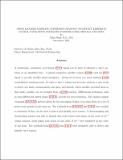Using Random Sampling Consensus (RANSAC) to Detect Errors in Global Navigation Satellite Systems (GNSS) Signals and Data
Author
Shah, Nihar
Abstract
A positioning, navigation, and timing (PNT) signal can be used to estimate a user's position at an identified time. A global navigation satellite system (GNSS) uses the PNT signal to provide satellite-based navigation. Advanced receivers can track multiple GNSS constellations simultaneously. In order to have a robust and accurate solution, a user needs to detect any faulty measurements and data, and identify which satellite provided them so that faulty satellite can be excluded from a GNSS solution. Differencing techniques, such as time-differenced carrier phase (TDCP), provide for error reduction. The random sample consensus (RANSAC) method allows for the smoothing of data, even when there are a lot of gross errors present in the data set. The residuals from RANSAC and TDCP were studied to determine if they can be used to detect and identify error sources. A downsampling and thresholding method was able to identify first-order biases with slopes on the order of 10̄ ⁶ within minutes, while biases with slopes on the order of 10̄ ⁷ were identified on the order of one hour. The residuals from RANSAC and TDCP were ultimately able to detect and identify error sources.
Date
2021-12-03
Citation:
APA:
Shah, Nihar.
(December 2021).
Using Random Sampling Consensus (RANSAC) to Detect Errors in Global Navigation Satellite Systems (GNSS) Signals and Data
(Master's Thesis, East Carolina University). Retrieved from the Scholarship.
(http://hdl.handle.net/10342/9716.)
MLA:
Shah, Nihar.
Using Random Sampling Consensus (RANSAC) to Detect Errors in Global Navigation Satellite Systems (GNSS) Signals and Data.
Master's Thesis. East Carolina University,
December 2021. The Scholarship.
http://hdl.handle.net/10342/9716.
June 29, 2024.
Chicago:
Shah, Nihar,
“Using Random Sampling Consensus (RANSAC) to Detect Errors in Global Navigation Satellite Systems (GNSS) Signals and Data”
(Master's Thesis., East Carolina University,
December 2021).
AMA:
Shah, Nihar.
Using Random Sampling Consensus (RANSAC) to Detect Errors in Global Navigation Satellite Systems (GNSS) Signals and Data
[Master's Thesis]. Greenville, NC: East Carolina University;
December 2021.
Collections
Publisher
East Carolina University

